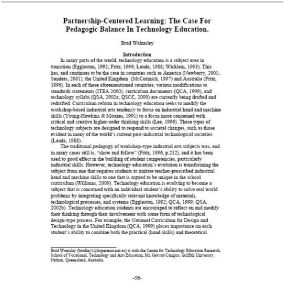Description:
In many parts of the world, technology education is a subject area in transition (Eggleston, 1992; Fritz, 1996; Lauda, 1988; Wicklein, 1993). This has, and continues to be the case in countries such as America (Newberry, 2001; Sanders, 2001), the United Kingdom (McCormick, 1997) and Australia (Fritz, 1996). In each of these aforementioned countries, various modifications to standards statements (ITEA 2000), curriculum documents (QCA, 1999), and technology syllabi (QSA, 2002a; QSCC, 2000) are currently being drafted and redrafted. Curriculum reform in technology education seeks to modify the workshop-based industrial arts tendency to focus on industrial hand and machine skills (Young-Hawkins & Mouzes, 1991) to a focus more concerned with critical and creative higher-order thinking skills (Lee, 1996). These types of technology subjects are designed to respond to societal changes, such as those evident in many of the world's current post-industrial technological societies (Lauda, 1988).
The traditional pedagogy of workshop-type industrial arts subjects was, and in many cases still is, "show and follow" (Fritz, 1996, p.212), and it has been used to good effect in the building of student competencies, particularly industrial skills. However, technology education's evolution is transforming the subject from one that requires students to imitate teacher-prescribed industrial hand and machine skills to one that is argued to be unique in the school curriculum (Williams, 2000). Technology education is evolving to become a subject that is concerned with an individual student's ability to solve real world problems by integrating specifically relevant knowledge of materials, technological processes, and systems (Eggleston, 1992; QCA, 1999; QSA, 2002b). Technology education students are encouraged to reflect on and modify their thinking through their involvement with some form of technological design-type process.
Target Audience: 2-4 Year College Faculty/Administrators |
|


















Resource Comments